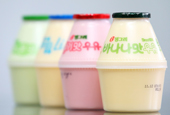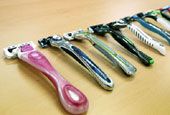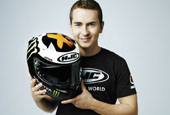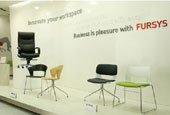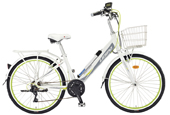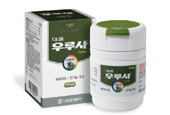There is a product that has lived together with people in the home over many years, just like a plain, old cotton shirt. It is Mukunghwa soap, a soap that mothers most commonly associate with doing the laundry. A mukunghwa is the country's national flower, the rose of Sharon, an apt name for a cleaning product.
Mukunghwa soap has been loved by the public even before laundry machines became common entities in every household. It is not an exaggeration to say that the company Mukunghwa wrote the history of soap and detergent in Korea over the past 67 years, since its establishment in 1947. Mukunghwa soaps have been a staple in every laundry room across the country and each household has had at least a few bars of the soap over the many years. It is a friendly entity that not only helps clean our clothes, but also our minds.
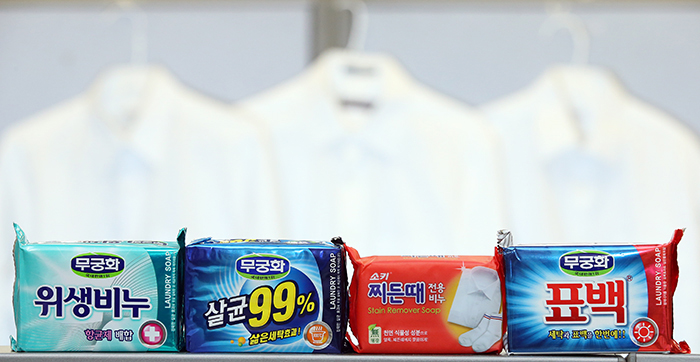
Mukunghwa's history dates back to the 1940s when soap was very rare for most people. Yu Han-seop, the late founder of Mukunghwa, who was born in Uiju, Pyeonganbuk-do (North Pyeongan Province), encountered many people in the streets wearing dirty clothes. He then learned how to make soap and gave away the bars to people he knew. It was a difficult time and it wasn't easy to find the raw material for soap. He had to get animal fat from butcher's shops. Without proper production facilities, he had to boil the animal fat in lye inside a drum placed on a furnace.
Yu produced bars of laundry soap with a rose of Sharon pattern printed on the top and gave them away or sold them. In 1947, he established his company, Mukunghwa, and started manufacturing Mukunghwa branded bars of laundry soap in a factory in Seosomun-dong, Seodaemun District, Seoul. However, the Korean War (1950-1953) broke out and the factory ceased operations. After the war, Yu started making laundry detergent again, selling the bars and carrying them by bicycle.
Yu founded a limited partnership, Mukungwha Oil & Fat Industries, in 1961 and began manufacturing refined glycerin. In 1966, the company's laundry bar soap received the KS Mark, a state certificate of quality.
The company continued to develop innovative products to lead the local laundry market. In 1980, it launched a powder laundry detergent, Saerowa, when there were only solid bars of laundry soap available on the market. In 1983, Mukungwha continued to build its reputation for making laundry soap when it completed construction of a new factory in Dongducheon, Gyeonggi-do (Gyeonggi Province), offering an extensive lineup of household goods. In 1986, the company launched a detergent with enzymes, Bright, and in the same year it launched an oxygen-based bleach, Top Clean.
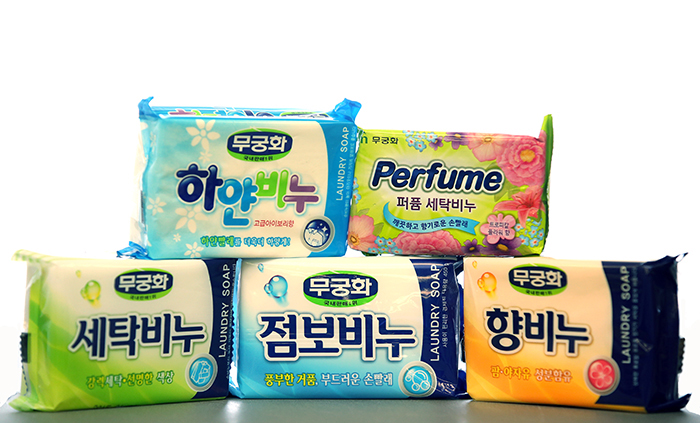
Mukunghwa has made an effort to develop environmentally friendly products. The company analyzed pollution caused by households and suggested the use of certain soaps and appropriate consumption methods to minimize pollutants. After years of R&D, in 2009 it developed an eco-friendly liquid detergent, Oclean, which uses only natural materials. Its cleaning power is outstanding, and negative effects on people's skin and the environment are minimal.
"In the past, people thought that if the products were cheap and they could generate a lot of foam and have strong cleaning power, they were good products," said Ha Hyeon-ho, a marketing manager at Mukunghwa, explaining why the company developed Oclean.
"However, these days people pay as much attention to whether these products are good for their health or well-being, too, especially concerning food. Consumers check really closely whether these products are harmful to one's body or skin and what kind of ingredients they use, all before making a purchase."
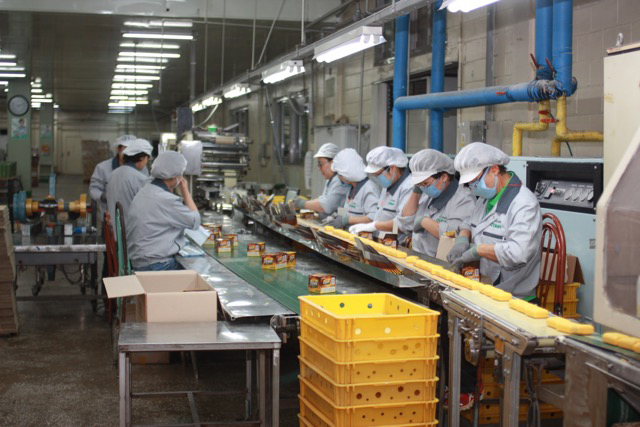
Mukunghwa started by making laundry soap but now produces a range of products, including facial soaps, powder detergents, liquid detergents, softeners, toothpastes, toothbrushes and cosmetics. Its products are sold not only in Korea, but also in many countries and regions, including China, Russia, Australia, Africa and Southeast Asia.
By Limb Jae-un
Photos: Jeon Han
Korea.net Staff Writers
jun2@korea.kr
Mukunghwa soap has been loved by the public even before laundry machines became common entities in every household. It is not an exaggeration to say that the company Mukunghwa wrote the history of soap and detergent in Korea over the past 67 years, since its establishment in 1947. Mukunghwa soaps have been a staple in every laundry room across the country and each household has had at least a few bars of the soap over the many years. It is a friendly entity that not only helps clean our clothes, but also our minds.

With 67 years of history, Mukunghwa has an extensive lineup of household goods and produces a range of laundry soaps.
Mukunghwa's history dates back to the 1940s when soap was very rare for most people. Yu Han-seop, the late founder of Mukunghwa, who was born in Uiju, Pyeonganbuk-do (North Pyeongan Province), encountered many people in the streets wearing dirty clothes. He then learned how to make soap and gave away the bars to people he knew. It was a difficult time and it wasn't easy to find the raw material for soap. He had to get animal fat from butcher's shops. Without proper production facilities, he had to boil the animal fat in lye inside a drum placed on a furnace.
Yu produced bars of laundry soap with a rose of Sharon pattern printed on the top and gave them away or sold them. In 1947, he established his company, Mukunghwa, and started manufacturing Mukunghwa branded bars of laundry soap in a factory in Seosomun-dong, Seodaemun District, Seoul. However, the Korean War (1950-1953) broke out and the factory ceased operations. After the war, Yu started making laundry detergent again, selling the bars and carrying them by bicycle.
Yu founded a limited partnership, Mukungwha Oil & Fat Industries, in 1961 and began manufacturing refined glycerin. In 1966, the company's laundry bar soap received the KS Mark, a state certificate of quality.
The company continued to develop innovative products to lead the local laundry market. In 1980, it launched a powder laundry detergent, Saerowa, when there were only solid bars of laundry soap available on the market. In 1983, Mukungwha continued to build its reputation for making laundry soap when it completed construction of a new factory in Dongducheon, Gyeonggi-do (Gyeonggi Province), offering an extensive lineup of household goods. In 1986, the company launched a detergent with enzymes, Bright, and in the same year it launched an oxygen-based bleach, Top Clean.

Mukunghwa produces a range of functional laundry soaps.
Mukunghwa has made an effort to develop environmentally friendly products. The company analyzed pollution caused by households and suggested the use of certain soaps and appropriate consumption methods to minimize pollutants. After years of R&D, in 2009 it developed an eco-friendly liquid detergent, Oclean, which uses only natural materials. Its cleaning power is outstanding, and negative effects on people's skin and the environment are minimal.
"In the past, people thought that if the products were cheap and they could generate a lot of foam and have strong cleaning power, they were good products," said Ha Hyeon-ho, a marketing manager at Mukunghwa, explaining why the company developed Oclean.
"However, these days people pay as much attention to whether these products are good for their health or well-being, too, especially concerning food. Consumers check really closely whether these products are harmful to one's body or skin and what kind of ingredients they use, all before making a purchase."

Mukunghwa runs a laundry soap production line at its factory in Dongducheon, Gyeonggi-do.
Mukunghwa started by making laundry soap but now produces a range of products, including facial soaps, powder detergents, liquid detergents, softeners, toothpastes, toothbrushes and cosmetics. Its products are sold not only in Korea, but also in many countries and regions, including China, Russia, Australia, Africa and Southeast Asia.
By Limb Jae-un
Photos: Jeon Han
Korea.net Staff Writers
jun2@korea.kr
